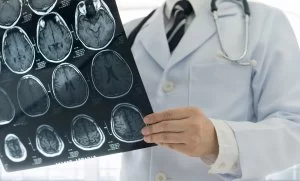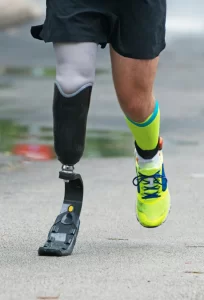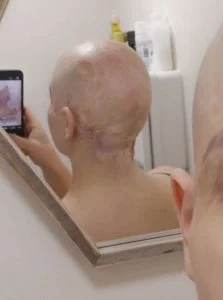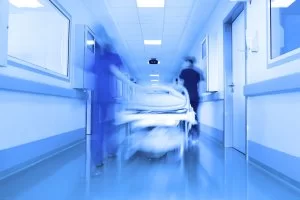Spinal Injury Solicitors
Spinal cord injury claims and compensation
Osbornes Law specialises in helping people who have suffered spinal cord injuries and other back and spinal injuries in any type of accident. Read on to find out if you can make a spinal injury claim and how we can help you.

“Ben is a real powerhouse and his brain has the size of a planet. He has an unparalleled ability to win cases.”

“Ben Posford heads the catastrophic injury team and covers a spectrum of spinal cord and brain injuries, as well as fatal accidents.”
Table of Contents
Spinal cord injuries are both traumatic and life-changing. At their worst, they can cause paralysis and leave you or a loved one with permanent disabilities. According to NHS figures, a spinal cord injury paralyses someone every four hours in the UK.
Even less severe spinal injuries can still cause loss of movement, problems with limb or bladder control, and numbness in the hands and feet. The road to recovery is long for serious spinal injuries and you may require extensive psychological and physical support.
No-one should have to suffer from the after-effects of a spinal injury due to someone else’s negligence, but accidents do happen and in a wide range of scenarios. Injuries sustained from road accidents, sporting incidents, accidents in the workplace, or as a result of medical negligence all have the potential to cause damage to the spine.
In any of these cases, you may be entitled to make a spinal injury compensation claim.
What classifies as a spinal injury claim?
A spinal injury might involve the bones of the spine or damage to the spinal cord. For simplicity, we can separate these injuries into two categories:
Spinal cord injury: This refers specifically to damage to the spinal cord, which is a very serious condition. The spinal cord is the bundle of nerves that runs down the middle of the vertebrae (spine) and carries signals between the brain and the rest of the body. If it is severed, the result is partial or complete paralysis for which there is no cure. Incomplete injury, where the spinal cord is damaged but not severed, may result in limited mobility and sensation with the potential for some recovery over time.
Back injury (spinal column injury): This broad term refers to any type of injury affecting the back, but without damaging the spinal cord. Back injuries can range from mild muscle strains, which are common and often heal with rest and conservative treatment, to more severe injuries such as fractures of the vertebrae and herniated discs. In most cases, a spinal column injury will not result in permanent loss of movement. Visit our dedicated back injury page to learn more.
What causes spinal injuries?
The most common cause of spinal injury is physical impact to the body that damages the back and neck. This may be the result of:
- Car Accidents
- Cycling Accidents
- Motorcycling Accidents
- Accidents at Work
- Slips, Trips and Falls
- Falls from Height
- Sports Injuries
- Criminal Assault
The consequences of a spinal injury can vary greatly depending on the severity of the accident. Some injuries place significant limitations on a person’s ability to move and work, and may put an end to the injured person’s career.
The impact extends to the family of those affected, who may have to provide significant support and personal care.
If your spinal cord injuries are the fault of someone else, you might have a compensation claim. This could be due to a motorist driving recklessly, your employer failing to follow health and safety procedures, or a poorly maintained sports pitch. To make an injury claim, you have to show that another person was negligent and their actions or failures caused you harm.
Can medical mistakes lead to a spinal cord injury claim?
Spinal cord injuries can also be caused by medical negligence.
Medical negligence happens when the care you receive falls below the professional standard of a competent medical practitioner. Many actions and inactions may fall within this definition. The main ways in which medical negligence can lead to a spinal cord injury include:
- Failing to diagnose a neck or back fracture.
- Failing to perform the proper scans and tests, for example, an MRI to investigate a suspected disc prolapse.
- Ambulance crew ‘manhandling’, where suspected spine injuries are not properly immobilised.
- Surgical errors.
- Delays in treating cauda equina syndrome.
These events are not mutually exclusive and spinal injuries can often be caused or worsened by a series of medical events.
Proving what caused the injury is often the most complex part of a medical negligence spinal cord injuries claim. It requires experience, skill and knowledge from a specialised team that has your best interests at heart.
How do I make a spinal injury claim?
- Contact us for a free consultation. A specialist lawyer from our spinal injury claims team will advise you whether you have a claim and guide you through your best next steps.
- We will help collect relevant evidence such as medical records, financial statements, witness statements, and police reports to establish negligence or liability of the other party.
- We help you understand how much compensation you may be entitled to. It may be possible to secure interim payments before the final settlement to cover immediate rehabilitation costs for your spinal injury.
- Most claims are settled out of court, but if necessary, we will take the case to court to ensure fair compensation.
Proud to work with the Spinal Injuries Association
Osbornes is a longtime supporter and partner of the Spinal Injuries Association. The SIA advocates for exceptional care and quality of life improvements for people with spinal cord injuries. Their belief — that we share — is that a spinal injury should not stop you living your life to the fullest. Our team of solicitors works closely with the SIA to ensure that our clients with serious spinal cord injuries access the same opportunities as everyone else.
Our solicitors have received training on spinal cord injury from the SIA, so they understand your condition and what you need. That knowledge helps us value your claim accurately and signpost you to the right support, to ensure you get the best outcomes from your rehabilitation and your legal claim.
Our team also abides by the Spinal Injuries Association Code of Conduct, which is backed by the Association of Personal Injury Lawyers. Solicitors who sign up to the code agree to put your best interests first and communicate with you in a clear and compassionate way.
Why choose our expert spinal injury lawyers?
Here’s why spinal-injured clients work with us:
- Our lawyers act exclusively for individuals who have suffered spinal injuries due to personal injury or medical negligence.
- A reputation for exceptional success, winning seven or eight-figure compensation payments in serious spinal injury claims.
- Compassionate and thorough support: we will always treat you and your family with dignity and respect.
- Approved lawyers for the Spinal Injuries Association.
- Consistently rated highly by The Legal 500 and Chambers and Partners for our reputation as spinal cord injury and back injury specialists. Additionally, our personal injury Partner, Ben Posford, specializing in spinal cord injuries, is a band one (top-ranked) leading individual in Chambers & Partners.
- ‘No win, no fee‘ funding agreements.
- We are committed to accessibility and can visit you at home or in hospital.
Spinal Cord Injury Claim FAQs
Is there a time limit for making a spinal injury claim?
The usual time limit for bringing a spinal injury claim is three years from the date of the incident. Exceptions include if the injured person is a child or they lack the mental capacity to make a claim.
If you think you might have a claim, it is important to act fast. Evidence and witness recollections can fade or become muddled with time. Our spinal injury solicitors are here to help you as soon as you are ready to make a claim.
How much compensation will I receive for a spinal injury claim?
The amount of compensation you could receive will depend on the seriousness of your spinal injury and the impact it has on your life. No two awards are exactly the same.
We work hard to negotiate the maximum compensation and have a reputation for securing multi-million-pound compensation awards for our most seriously injured clients. You can put the compensation you receive towards the costs of:
- Lost earnings
- Ongoing treatment and therapy costs
- Assistance with everyday tasks
- Specialist equipment
- Appropriate housing and home adaptations
- Travel expenses to therapy sessions
- Financial support for your family
Can I get help with costs before my spinal cord injury case reaches a conclusion?
With a serious spinal cord injury, you may have lost earnings or you may have to pay for rehabilitation, home adaptations or specialist equipment. This can place an unreasonable burden on your family, beyond the challenges caused by the injury itself.
For serious injury cases, we can usually arrange for interim payments to be made well in advance of the final decision. This can help you get the right help going forward, including the early rehabilitation you need.
Interim payments are only available when the other party (or their insurer) has admitted they are to blame for your spinal cord injury in full or in part. We can help prove liability and secure interim payments early on in your case. Please contact us to establish your legal position today.
Can I change my solicitor if I've already started a spinal injury claim?
You will spend many months or years working with your solicitor and sometimes that relationship may break down. If this has happened, then you can seek to change your solicitor. It is important that you feel at ease with your solicitor and feel confident that they understand your difficulties.
Changing solicitors is a fairly straightforward process and much easier than people think. If you are looking to move to Osbornes Law our solicitors will deal with this for you.
How long will the claim process take?
Spinal cord injury claims tend to be more complex than other types of personal injury claims, simply because your injuries are longer-lasting and more medically complex. Cases involving spinal cord injury and paralysis may take up to three years to conclude, but this can depend on whether the other side denies liability or whether they admit the claim.
At Osbornes, we aim to secure the maximum level of compensation in the shortest possible time frame. We also work hard to secure interim payments for you wherever possible.
Small but very effective and experienced team so every client benefits from the personal touch but also highly skilled litigation know-how. Capability of the team means they can handle all aspects of very complex cases as well as straightforward matters.
Ben Posford typically operates in the team’s spinal cord and cauda equina syndrome litigation.
The team frequently represents claimants in complex cognitive and spinal injury disputes, involving hypertensions, spinal fractures, as well as inadequate treatment of heart and blood diseases.
Osbornes covers a spectrum of spinal cord and brain injuries, as well as fatal accidents, spanning spinal cord and brain injuries.
Osbornes is a very respected firm in the marketplace.
They handle really complex cases very well
The clinical negligence team are knowledgeable and professional in their approach and demonstrate a high level of skill in litigation work.
Osbornes Law offers experience in obstetric and fatal claims as well as niche cauda equina cases.
Osbornes Law is an established firm which handles a breadth of complex and high-value clinical negligence matters.
Osbornes has a skilled team of solicitors advising clients on a wide range of clinical negligence matters.
Hard working, approachable, good knowledge of clinical negligence and clients’ specific conditions
A joy to work with and always 100% client focused at all times.
The clinical negligence team at Osbornes is much lauded for its ability to ‘represent the diverse range of London-based clients
“The team is very quick and efficient in responding."
"Obsbornes Law is always client-focused and works tirelessly to obtain the best outcomes for clients."
Jodi Newton acts for clients on claims arising from negligent obstetric care, sepsis and delays in diagnosis and treatment. She also advises on spinal injury claims.
'The team deals with multi-million pound, often multifaceted claims, involving such factors as severe brain, psychiatric, gynaecological and spinal injury, major trauma, amputation and fatality.'
‘They are ambitious for their clients and expect high standards from all who work with them.’
"Osbornes somehow combine the accessibility of a local firm, with the professional standards of a national or city outfit."
"Osbornes, is described as having ‘superb judgement and a medical knowledge that is second to none."
Stephanie has developed a particularly strong reputation for her handling of birth injury claims, as well as cases concerning surgical negligence and delays in surgery.
"An excellent firm which achieves fantastic outcomes for clients."
"Stephanie Prior takes on complex cases and gets excellent results. She has a background in medicine which serves her clients well and is a realistic but tough litigator."
"Stephanie Prior is hugely dedicated, adored by her clients, tenacious, efficient and extremely knowledgeable."
"Stephanie Prior is very good with troubled clients and is easily able to make them feel at ease."
"Stephanie shows sensitivity and deals with things in an understanding way."
Osbornes provides a very intimate and personal client service which is increasingly rare in this sector.
The lawyers in the team are highly experienced and will drive cases very hard on behalf of their clients.
"Stephanie Prior has a realistic attitude to the complexities of the cases. She wins the trust of her clients and goes the extra mile to ensure they get the best outcomes."
"Stephanie Prior... manages a varied caseload, including obstetric claims, child and adult brain injury cases and fatal and non-fatal spinal cord injury cases."
"Stephanie is experienced, knowledgeable of all aspects of clinical negligence work, and strategic in running cases."
"An exceptional outfit. They take on difficult cases, fight hard and win."
"Solid personal injury practice well equipped to advise on high-value and high-profile claims arising from fatalities and severe head and spinal injuries."
"Offers specialist expertise in cauda equina syndrome cases."
"Osbornes often handles claims valued at over £1m, particularly relating to severe brain and spinal cord injuries and niche areas such as cauda equina syndrome and cycling accidents."
"The team were extremely professional in putting my needs first. There was a joined-up approach to catering for the client, and all lawyers involved were briefed and constructive."
Stephanie Prior is always very professional and kind. Highly recommended.
As a real specialist in spinal cord injuries, Ben Posford is always looking at new angles on how to maximise his cases.
Quite simply excellent, with a highly competent and well-rounded team. They understand complex medical litigation and have been our lifesavers, and we will always owe them our immense gratitude.
"Ben Posford is singled out for his expertise in high-level catastrophic claims, particularly his handling of devastating brain and spinal injuries"
Client StoriesVIEW ALL
- 17.1.2025
Student Makes Electrocution Compensation Claim
Student’s heart stopped after electrocution in London’s St James’ Park A university student had a heart attack and...
Read more - 29.4.2024
Settlement After Fatal Accident At a Roundabout
Fatal claim settled for a cyclist struck by a truck Laura Swaine recently settled a fatal accident claim for a...
Read more - 13.2.2024
5-figure Payout for Death of Hungarian Lorry Driver
Hungarian lorry driver tragically dies Siobhan McIvor, a Partner and Personal Injury lawyer, has successfully settled a fatal accident compensation...
Read more - 26.10.2023
Six-Figure Compensation for Victim of Reckless Scooter Driver
Siobhan McIvor, accredited Personal Injury Solicitor and Partner at Osbornes Law, has settled a case at a Settlement Meeting with...
Read more - 24.10.2023
Six-figure Settlement for Pedestrian Injured at Traffic Lights
Our client was a 68 year old homeless Polish National who was knocked over on a traffic light controlled crossing. He...
Read more - 14.2.2023
Fatal Accident Case Studies
Settlement for Pedestrian Killed Crossing the Road Laura Swaine, an Associate at Osbornes Law, acted on behalf of a family...
Read more - 3.2.2023
Bereavement Support Payment
What are Bereavement Support Payments? Bereavement Support Payments are a benefit provided by the government to help people cope with...
Read more - 18.1.2023
Pedestrian receives £1.75 million following amputation
Kate Milton, acted on behalf of a Romanian National who was hit by a vehicle as she was walking home...
Read more - 28.2.2022
6-Figure Settlement for Brain Injuries Caused by Car...
High-speed collision causes catastrophic brain injuries Our Spanish client was the front-seat passenger in a car driven by her husband...
Read more - 9.1.2022
Settlement secured for head injury caused by hammer...
Osbornes Law has secured a £100,000 settlement for her client who suffered serious head injuries after being attacked in prison by...
Read more - 16.11.2021
Significant lump sum for leg amputation
Introduction Mr N, a Romanian man in his 30s, came to the UK to work with his father-in-law in early 2018....
Read more - 5.11.2021
Seven figure leg amputation settlement
Workplace accident results in life-changing injury When our client (Mr S) suffered a devastating crush injury at work that led...
Read more - 26.10.2021
Examples of Serious Head & Brain Injury Settlements
C–v-N Child pedestrian crossing road knocked over by car when running into road sustaining a traumatic brain injury and...
Read more - 31.8.2021
Client pursuing head injury claim after life changing...
A young woman has told of the moment her head was completely scalped and lost her ear when her hair...
Read more - 2.8.2021
London Tube Sign Causes Head Injury: Case Study
Compensation for Pedestrian Injured by Falling Public Sign Brain Injury Claim after falling tube sign knocks pedestrian unconscious Incident Overview...
Read more - 22.7.2021
Croydon Tram Crash Inquest Concludes
Families of Croydon tram crash victims disappointed by Inquest conclusion The families of victims killed in the Croydon tram crash...
Read more - 1.7.2021
Limb amputation to pedestrian awarded £1.8million
Client Suffers Life-Changing Injuries in Pedestrian Accident Our client suffered life-changing injuries as she was walking home from work. A...
Read more - 23.6.2021
Client Story: Construction Accident Results in Amputation
Our Client’s Background and Employment Mr C a young Romanian national, came to this country for work in 2015. He...
Read more - 17.6.2021
Life changing injuries following motorbike accident
London motorcyclist hit by lorry Our client, who is from Hungary was riding his motorbike in London when a lorry...
Read more Serious Orthopaedic Injury Settlement for £1million
Settlement secured for life-changing injuries in HGV collision Our client, a 25-year-old Spanish national, was travelling in a work van...
Read more- 15.2.2021
Death due to fishing accident settled for £125,000
Client drowns following a boat collision Fatal Accident claim following the death of Mr D who drowned as a result...
Read more - 15.10.2020
Fatal Accidents In The Workplace
A new article from the BBC takes a looked at fatal accidents at work. The report states that since 1981, there...
Read more - 5.10.2020
£50,000 secured for family after loss in road accident
Case Background Sam Collard, an Associate in the Osbornes serious injury team, recently settled a fatal accident claim brought on...
Read more - 15.9.2019
Osbornes Settles Brain Injury Case For Six Figure...
Case Overview: Brain Injury in Road Accident Osbornes acted for a Hungarian doctor who sustained a serious brain injury in...
Read more
Essential Reading
News & InsightsVIEW ALL
- 3.2.2023
Bereavement Support Payment
What are Bereavement Support Payments? Bereavement Support Payments are a benefit provided by the government to help people cope with...
Read more - 22.7.2021
Croydon Tram Crash Inquest Concludes
Families of Croydon tram crash victims disappointed by Inquest conclusion The families of victims killed in the Croydon tram crash...
Read more - 15.10.2020
Fatal Accidents In The Workplace
A new article from the BBC takes a looked at fatal accidents at work. The report states that since 1981, there...
Read more
































